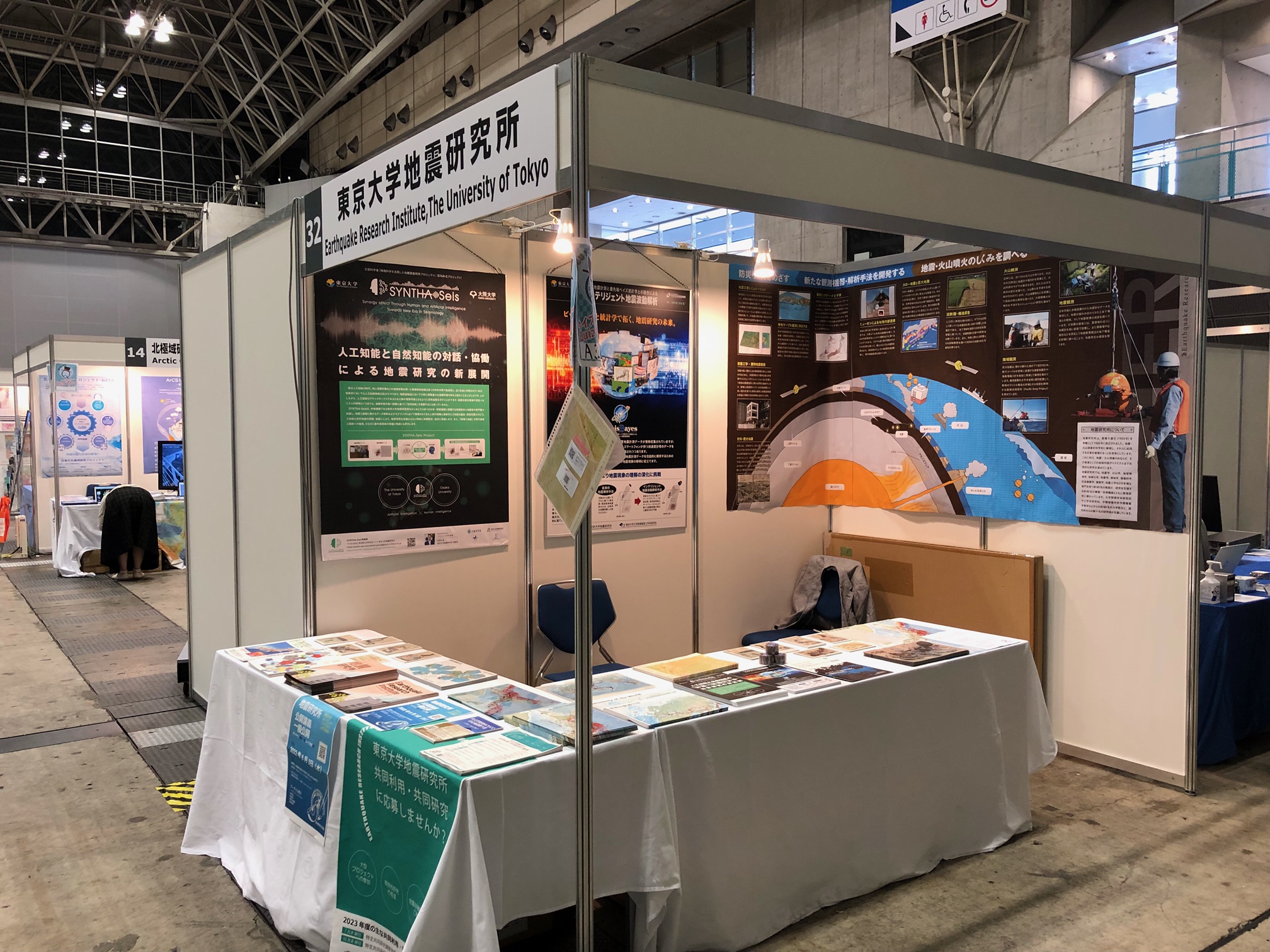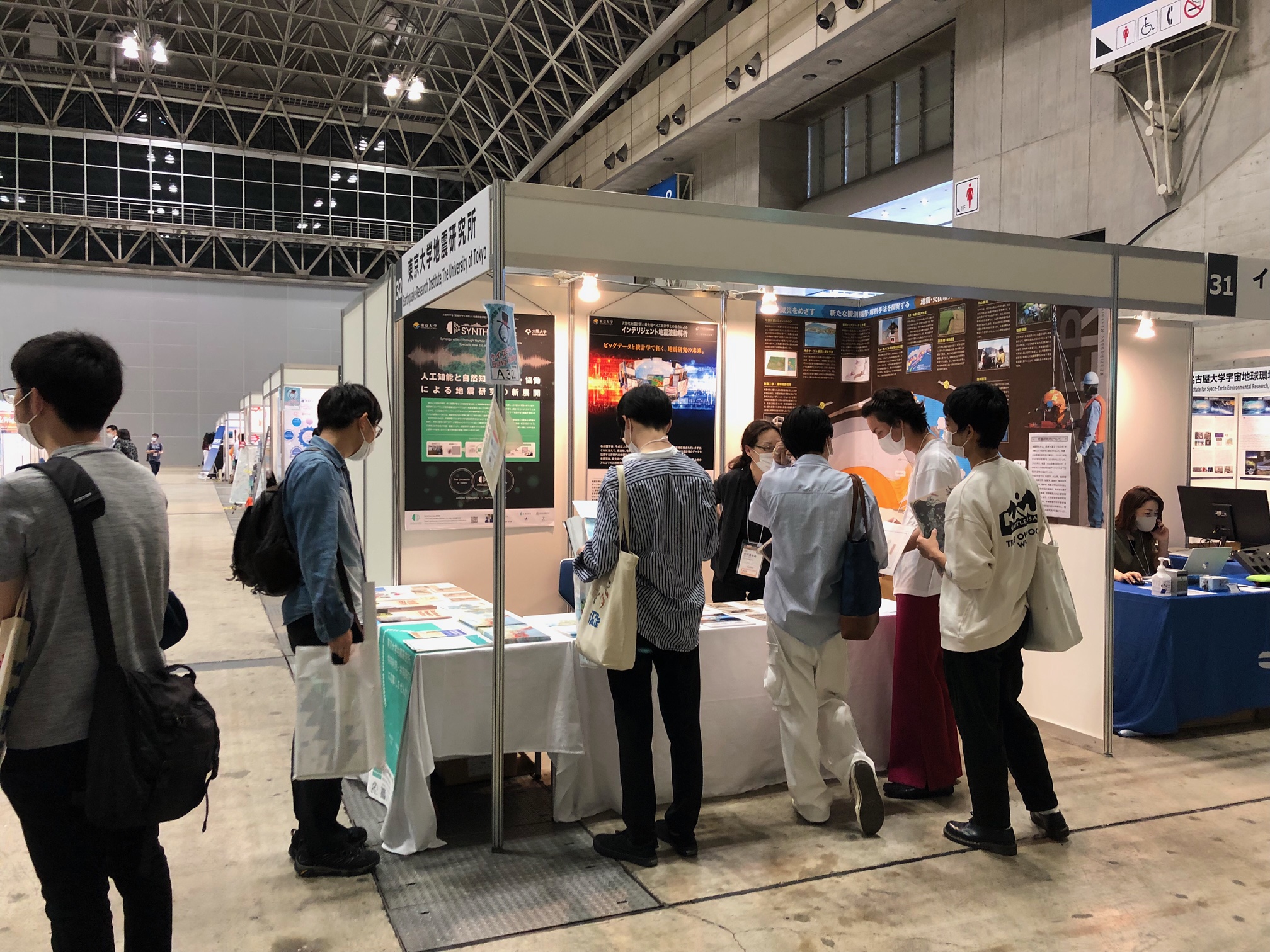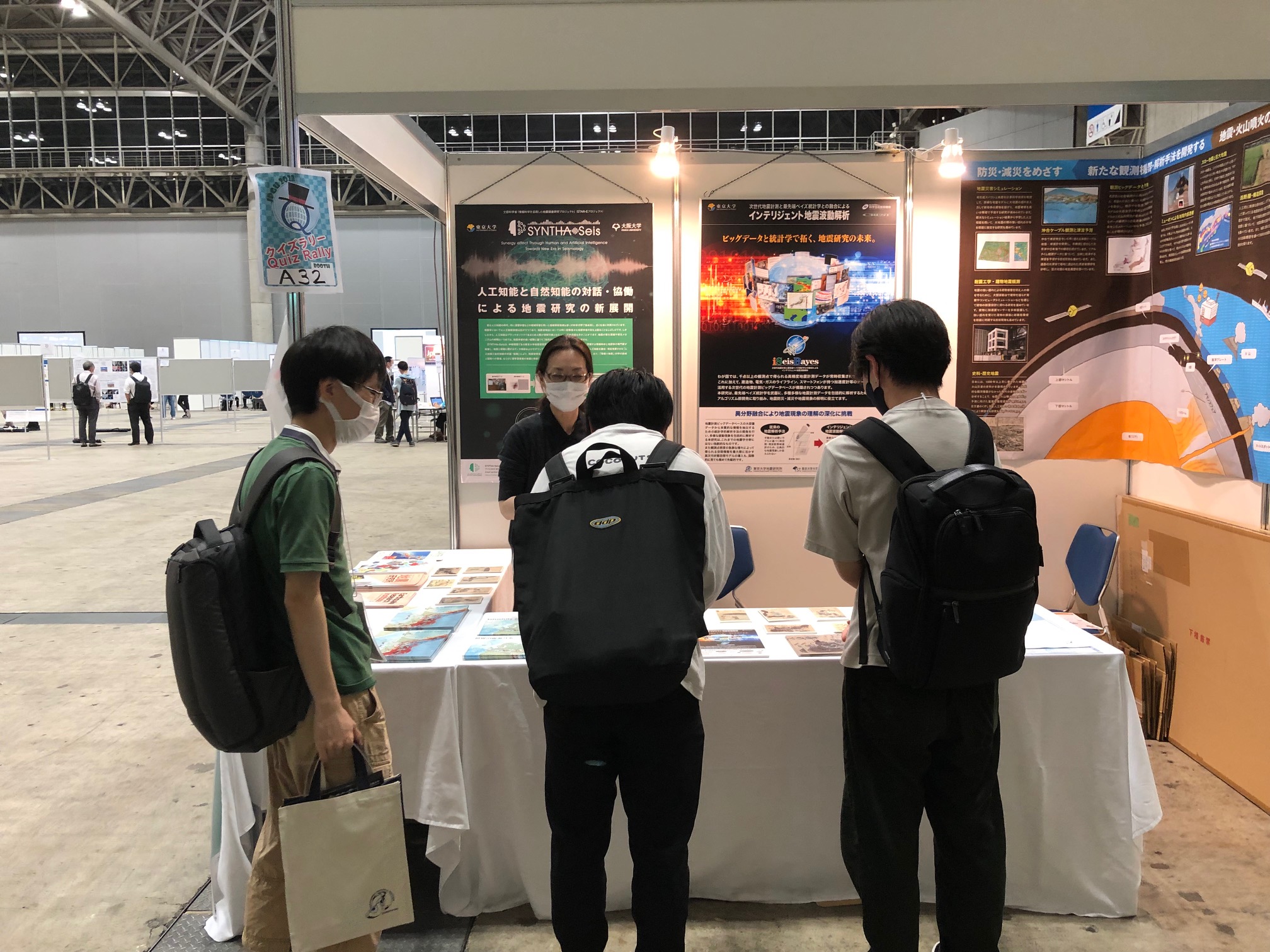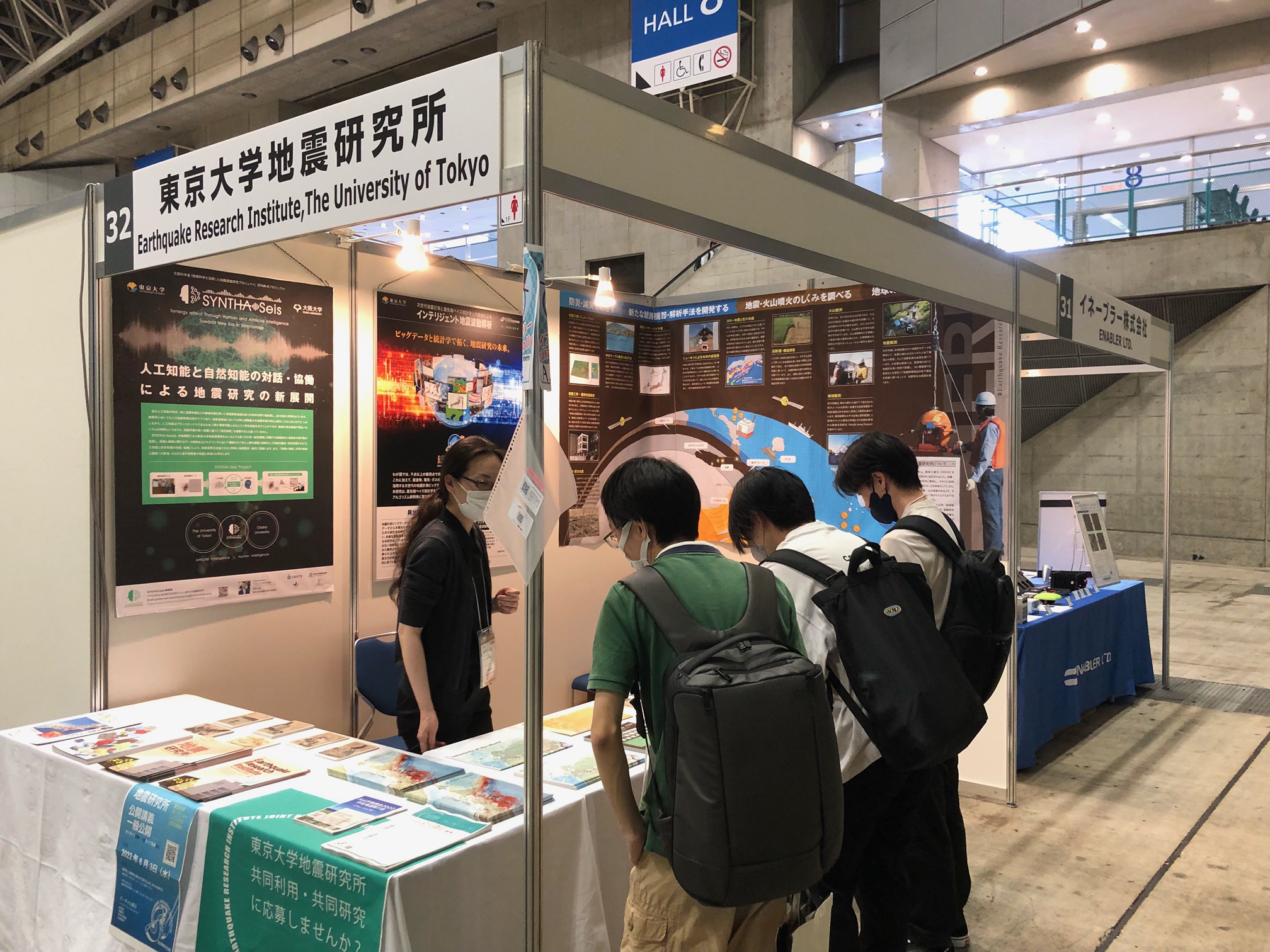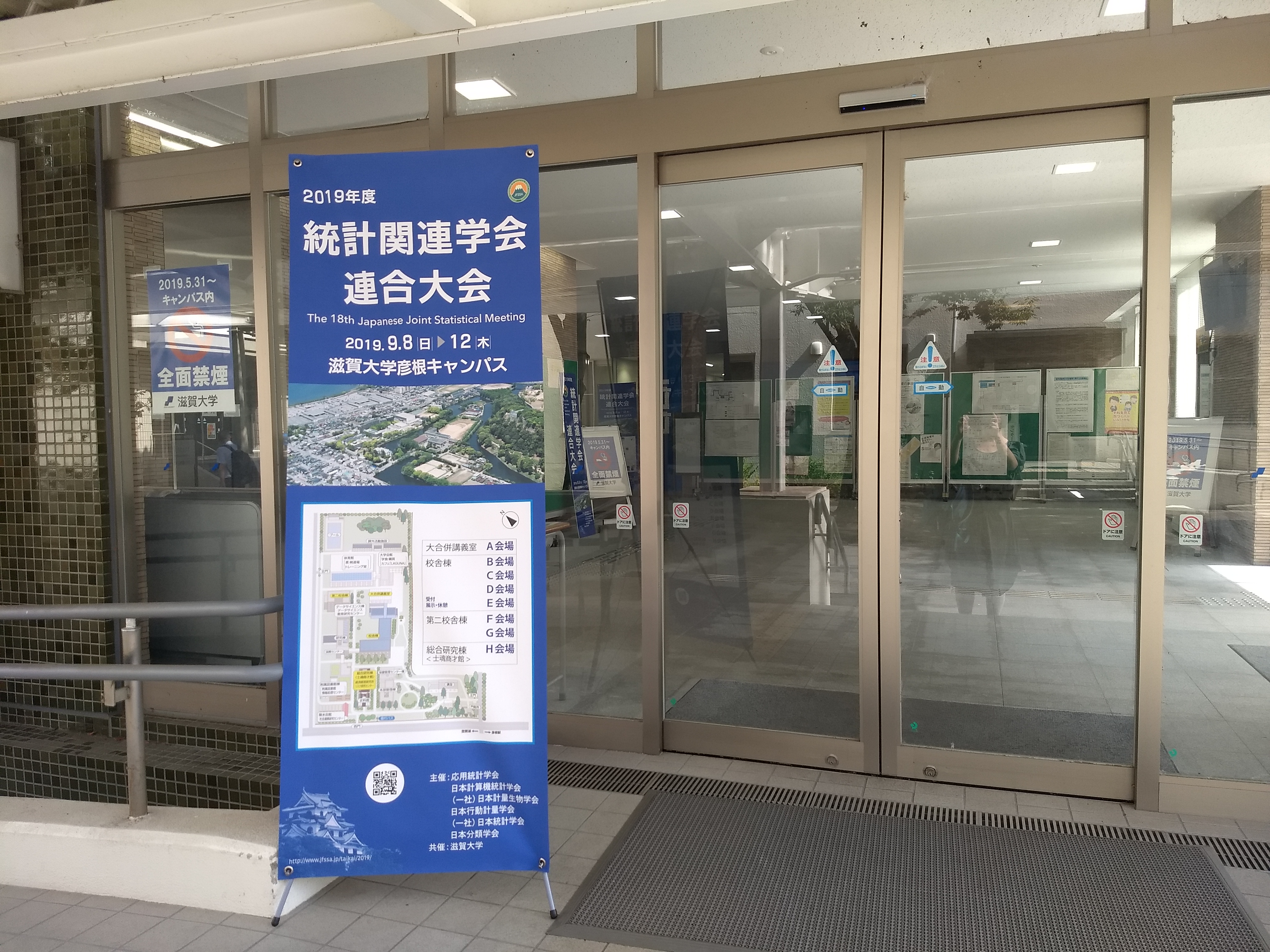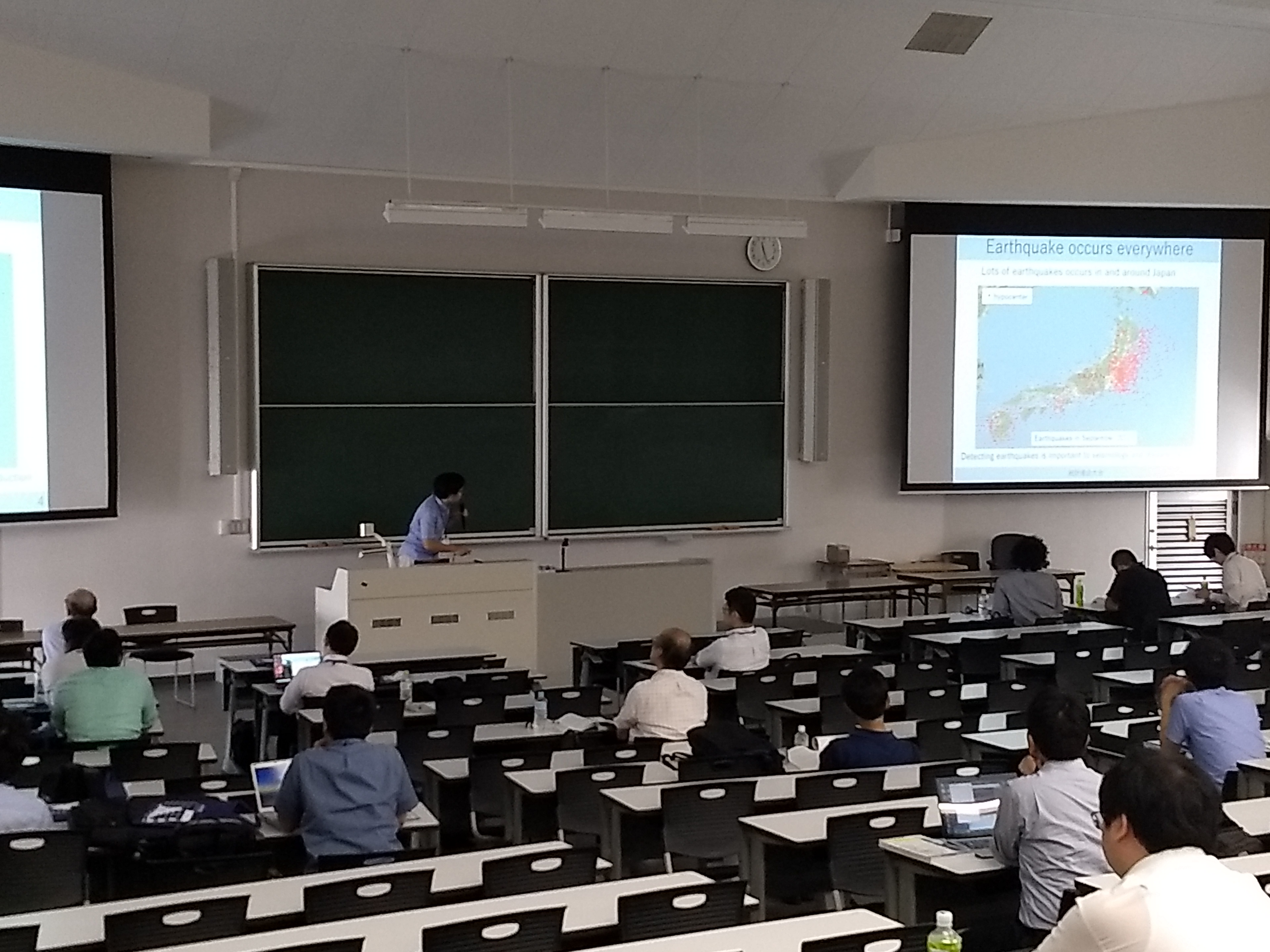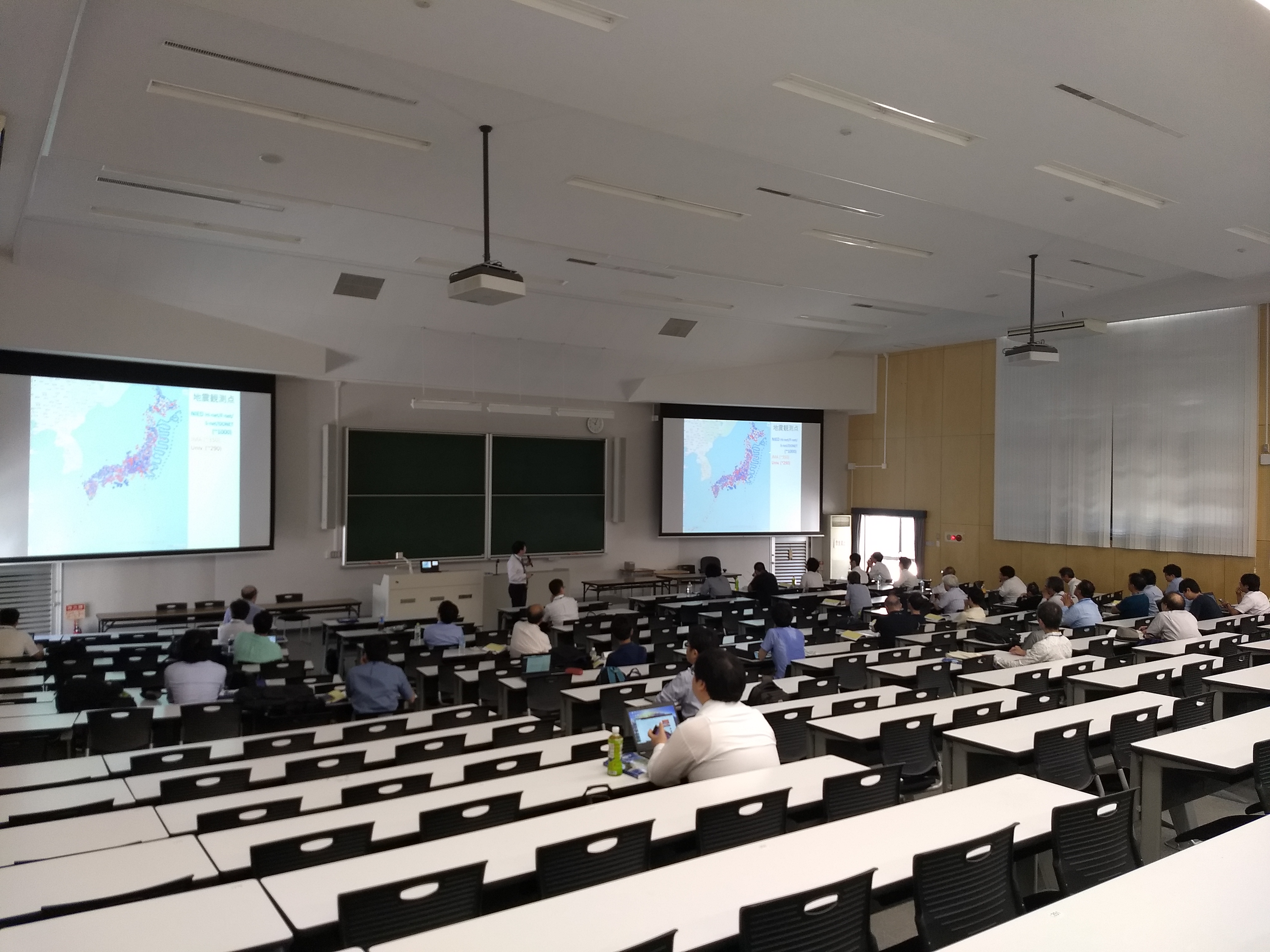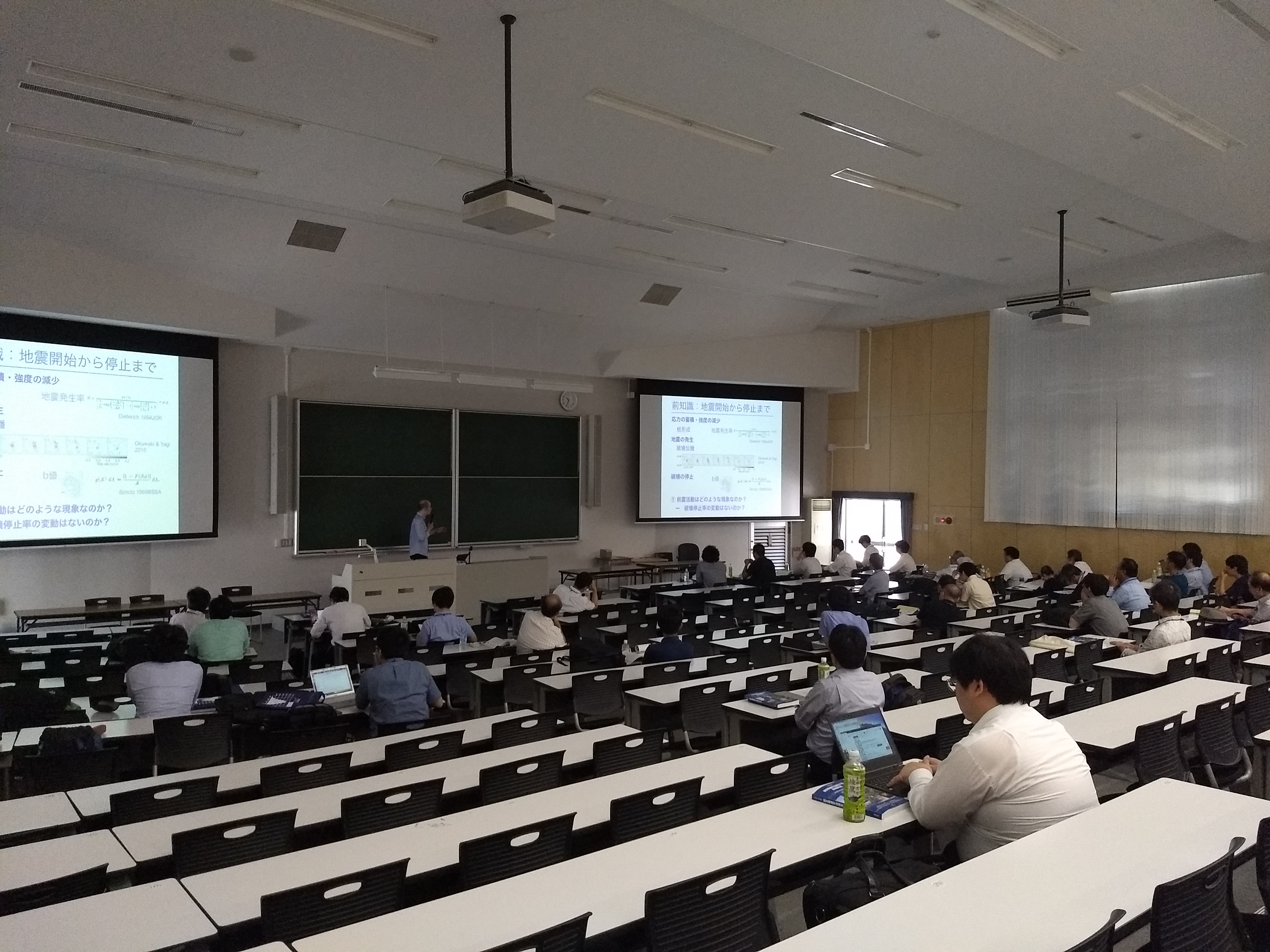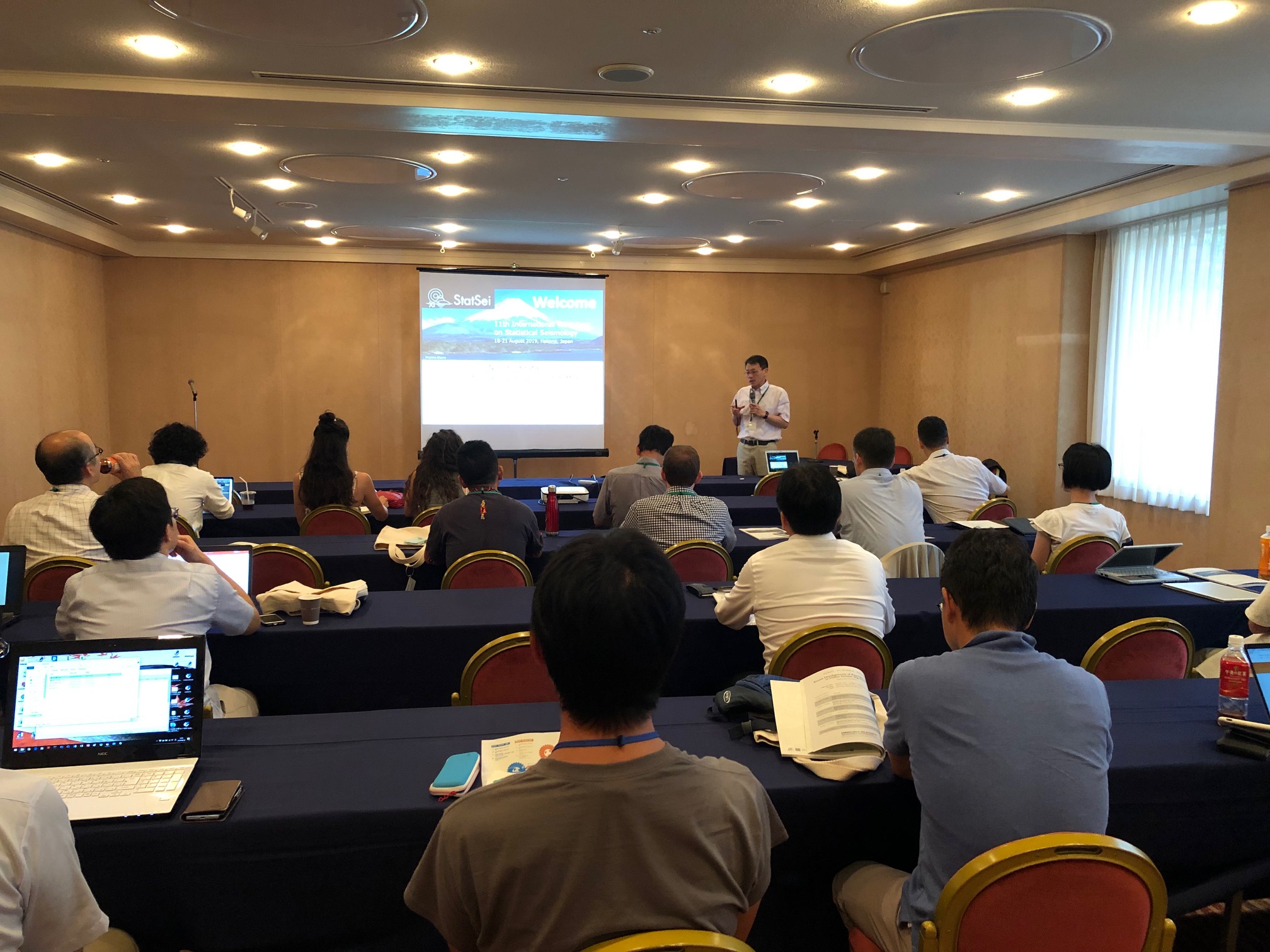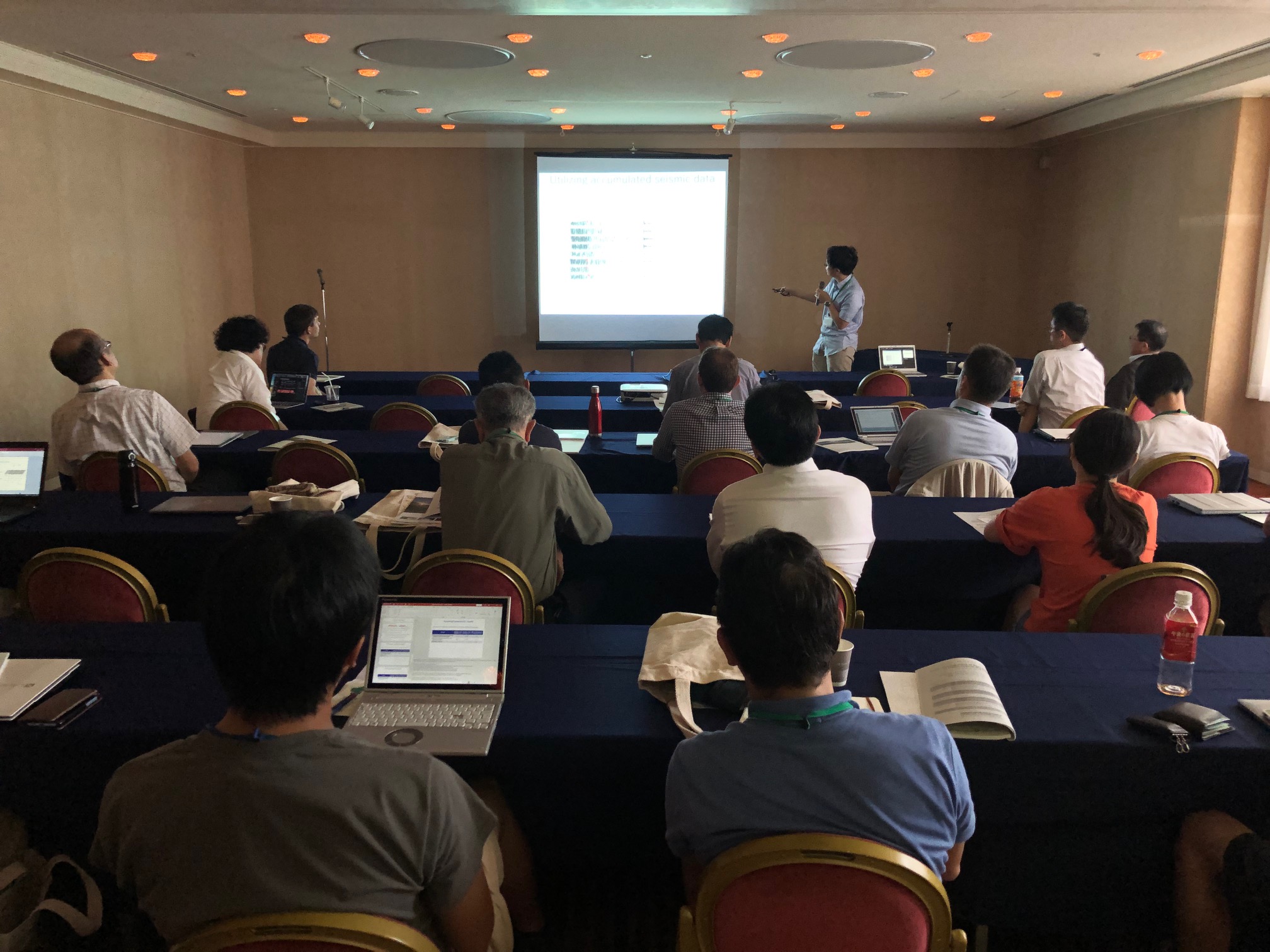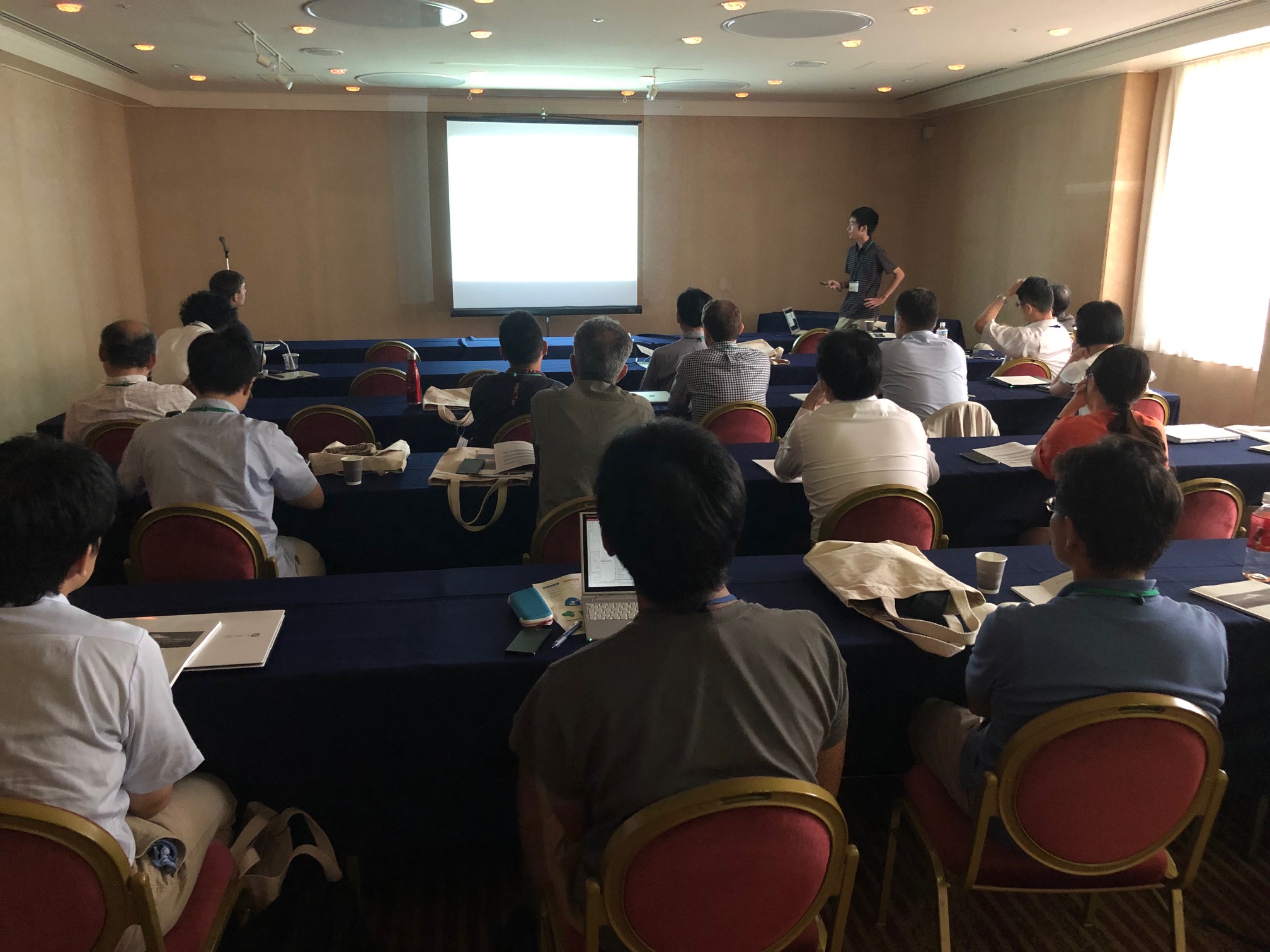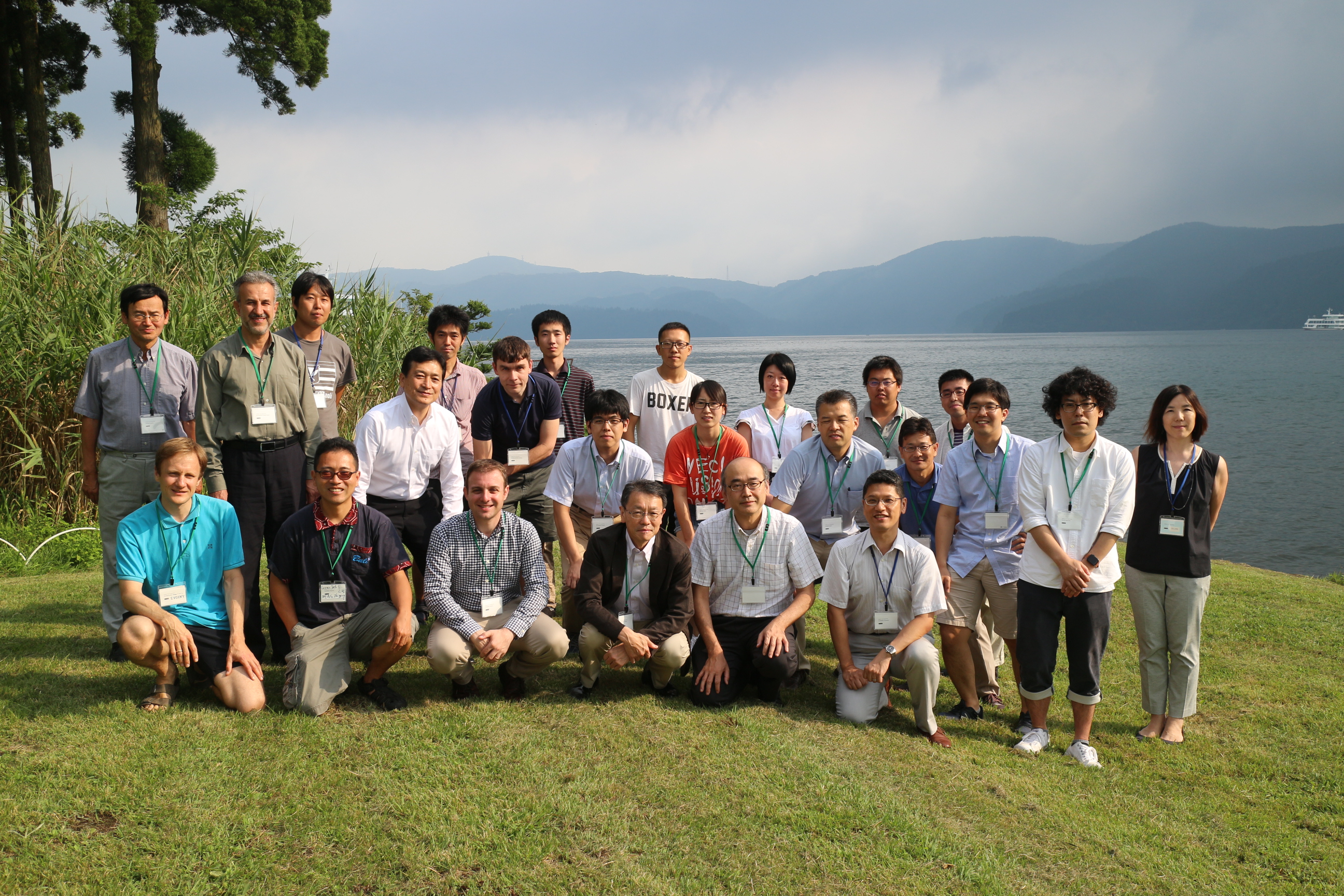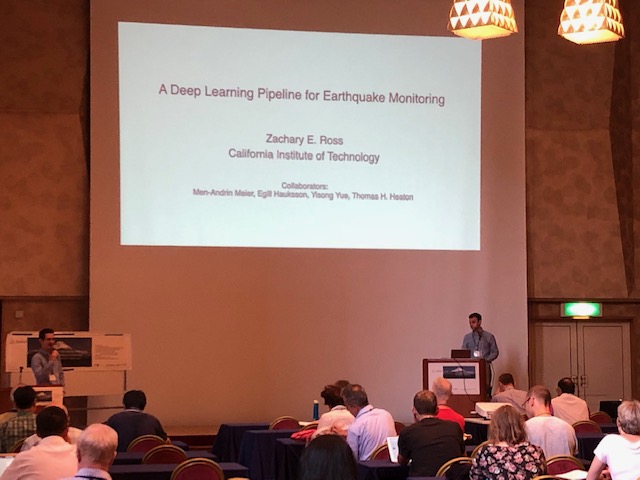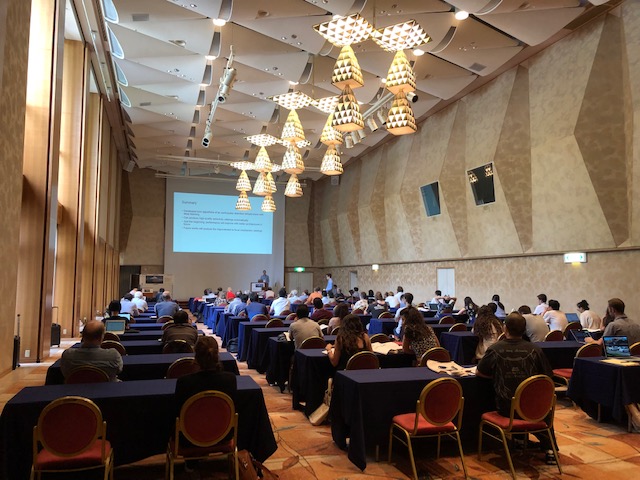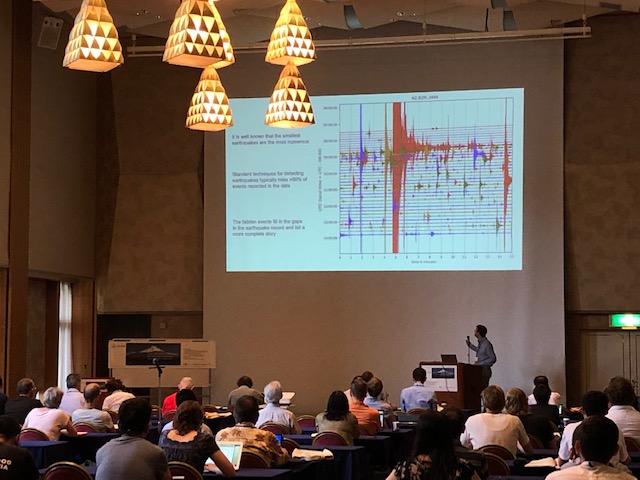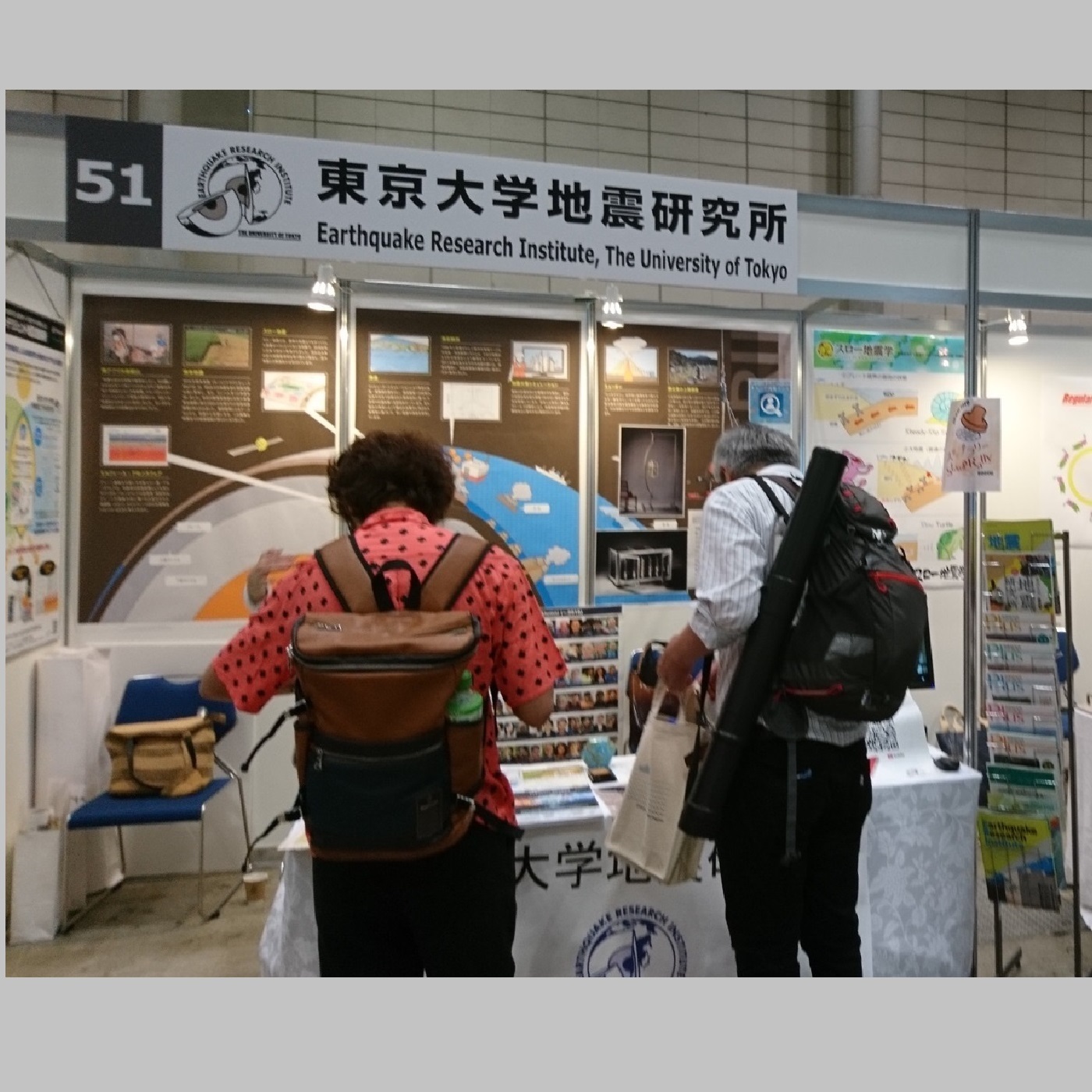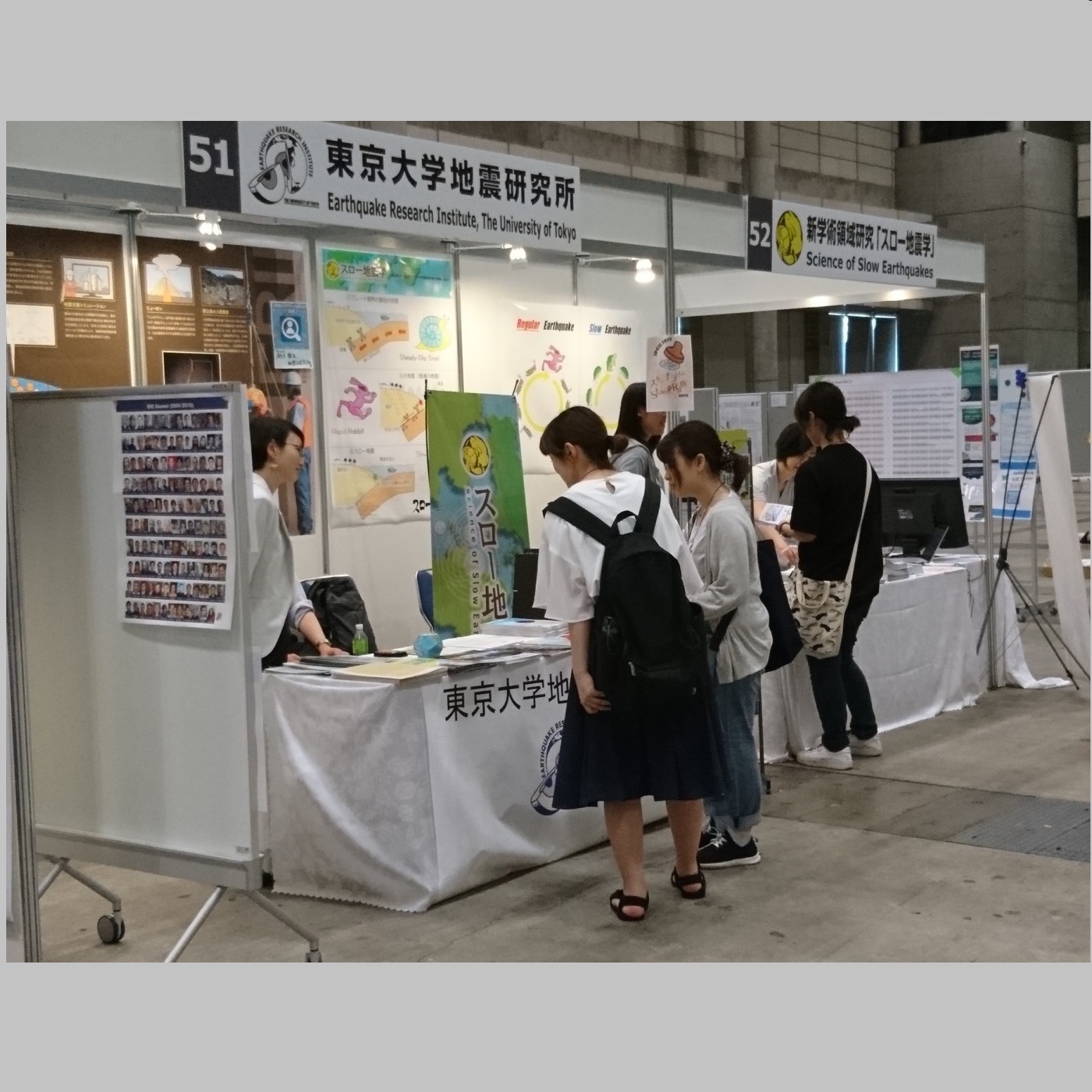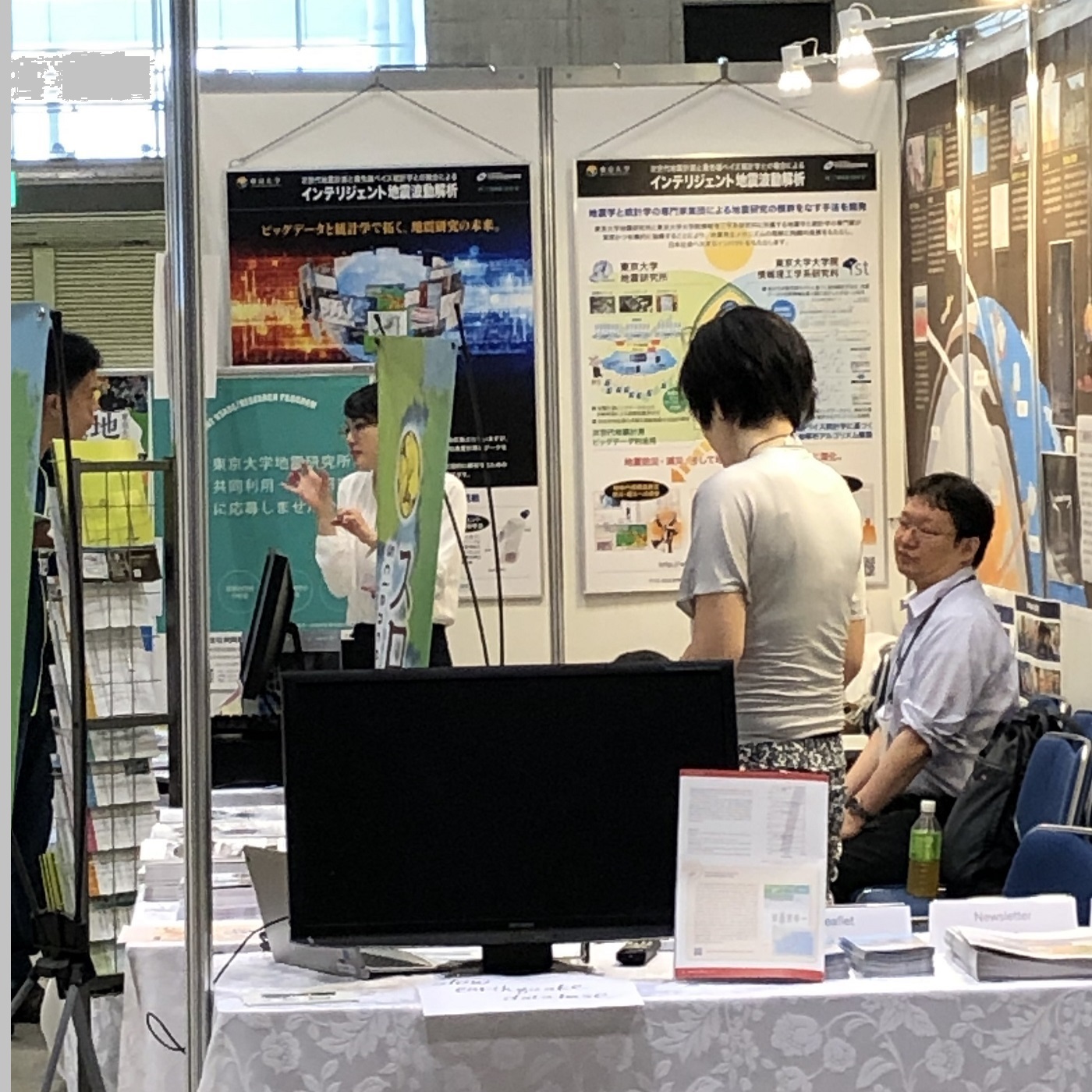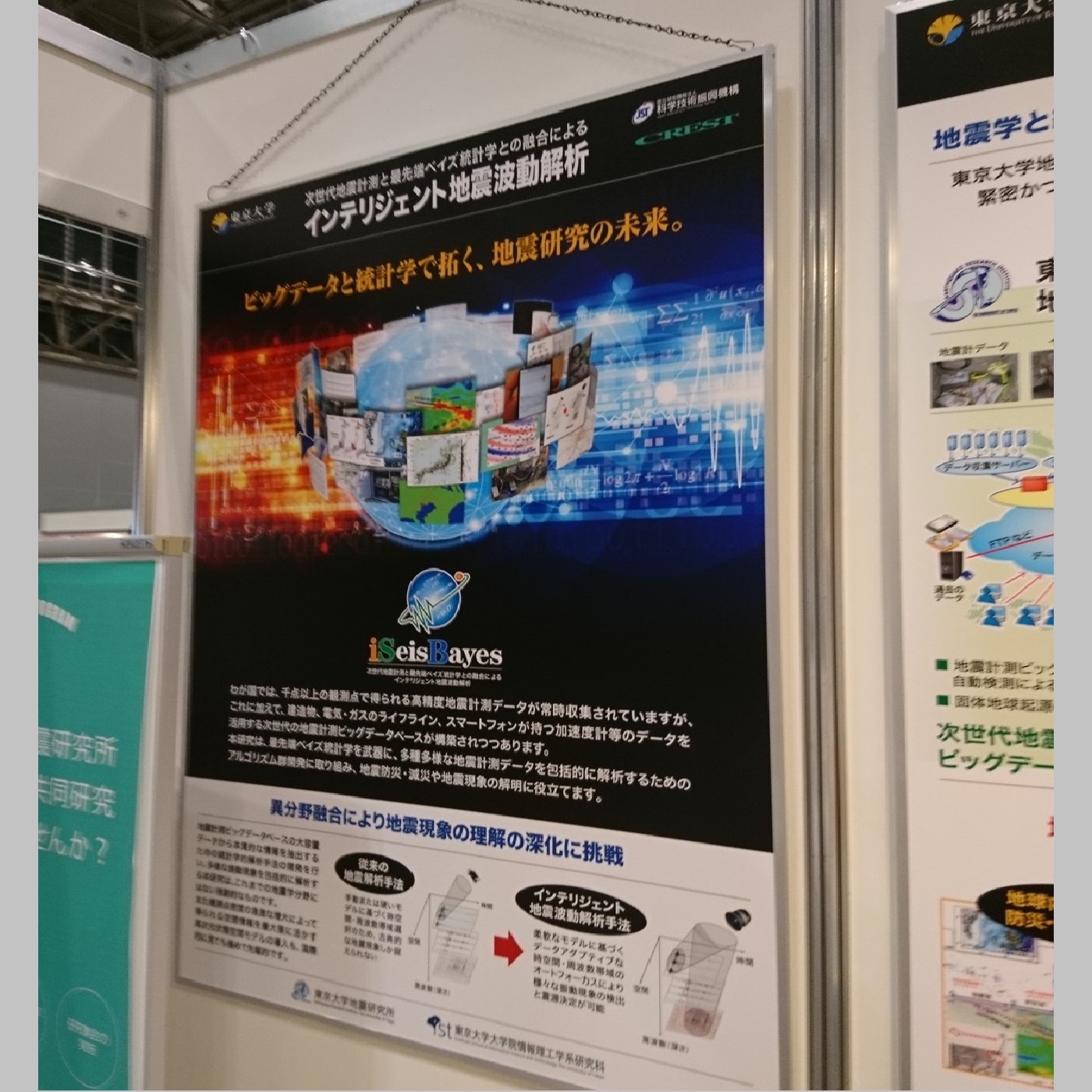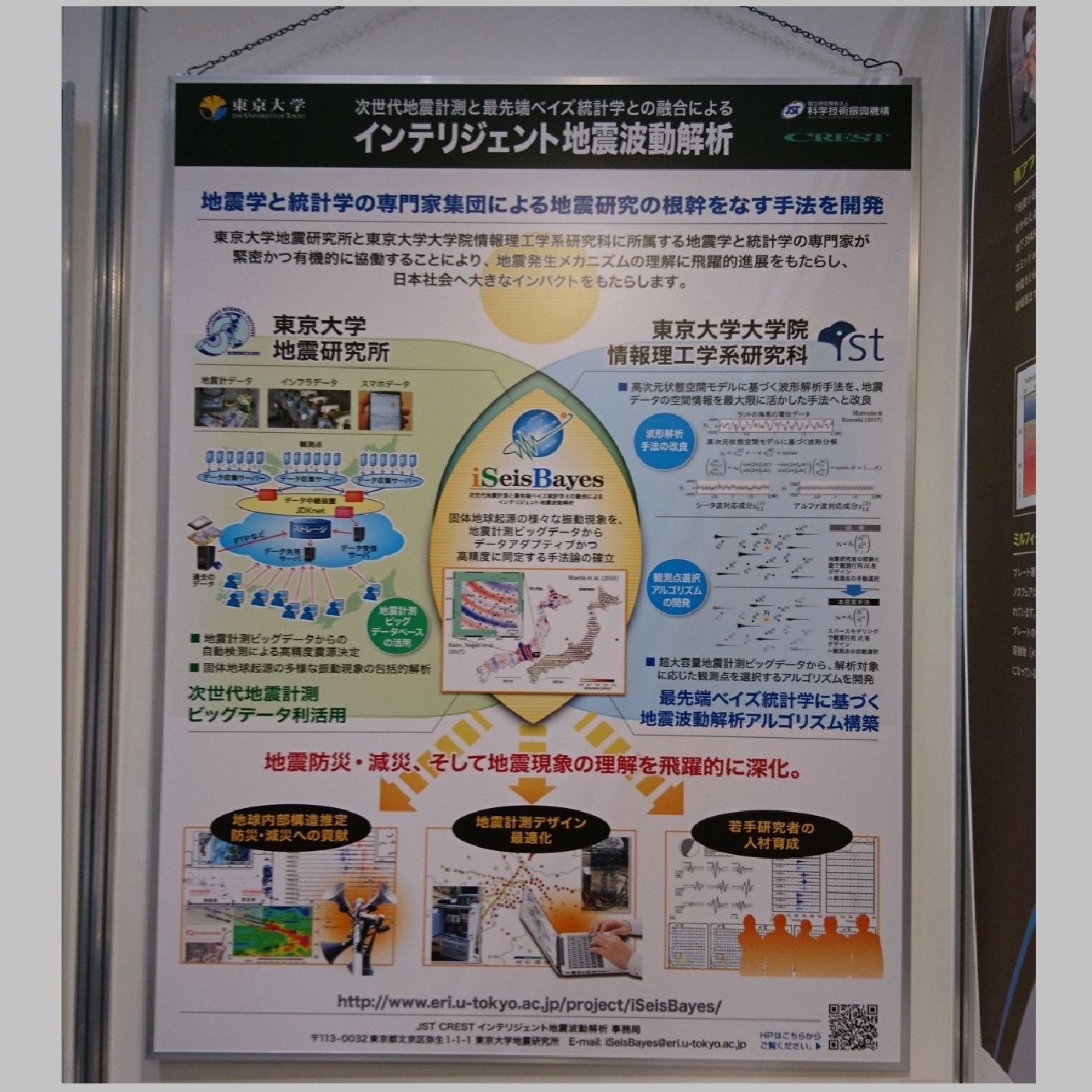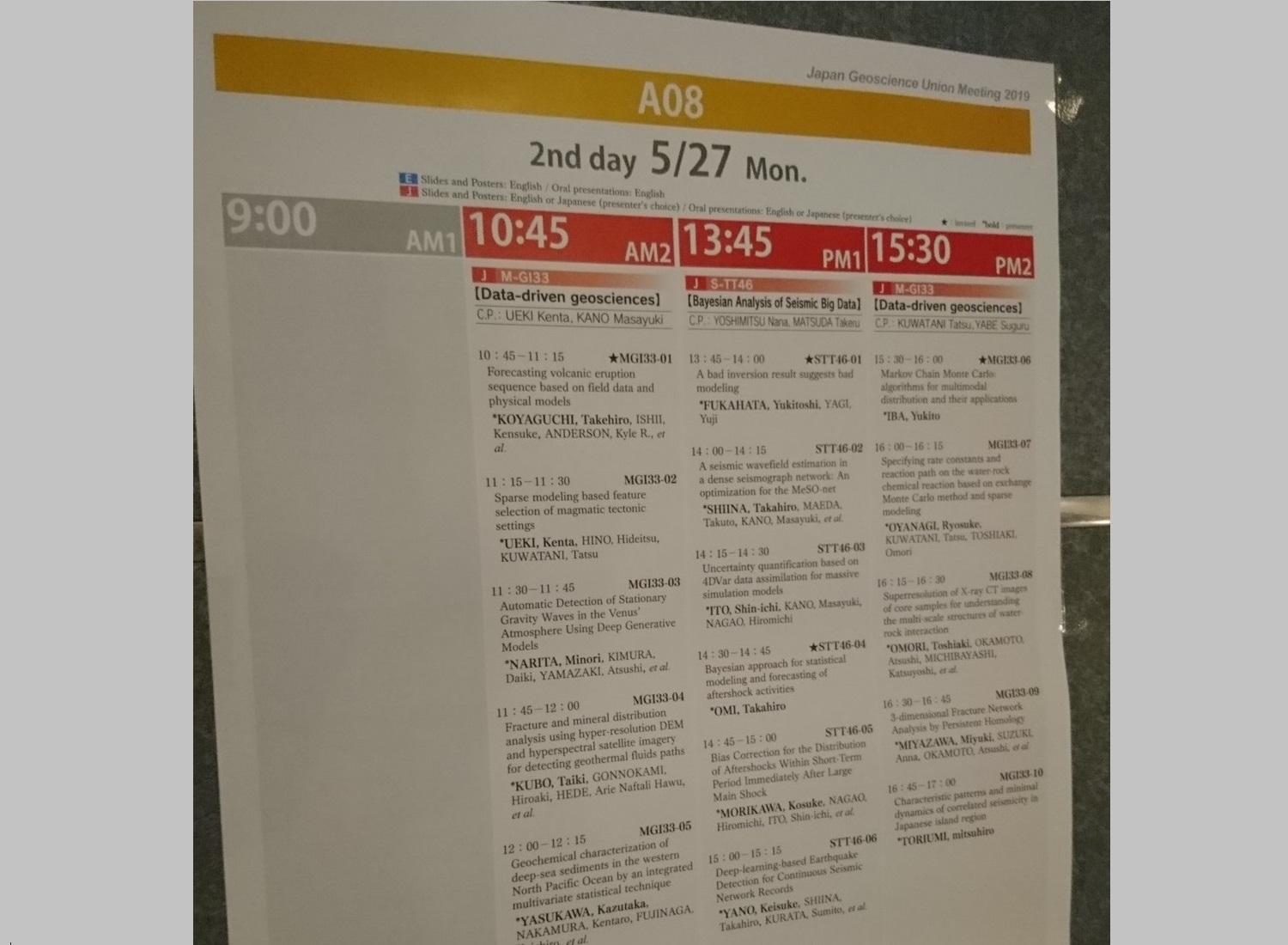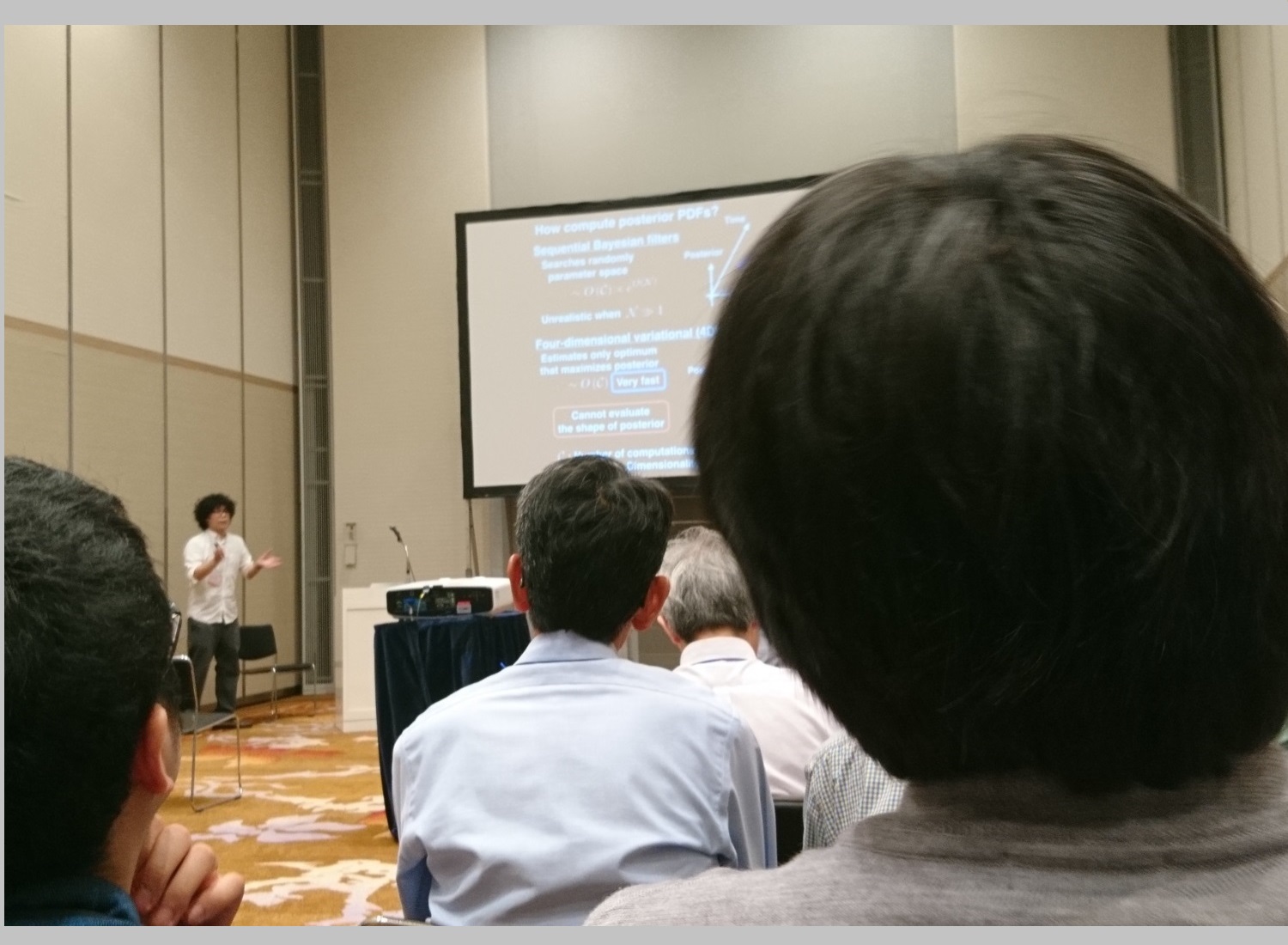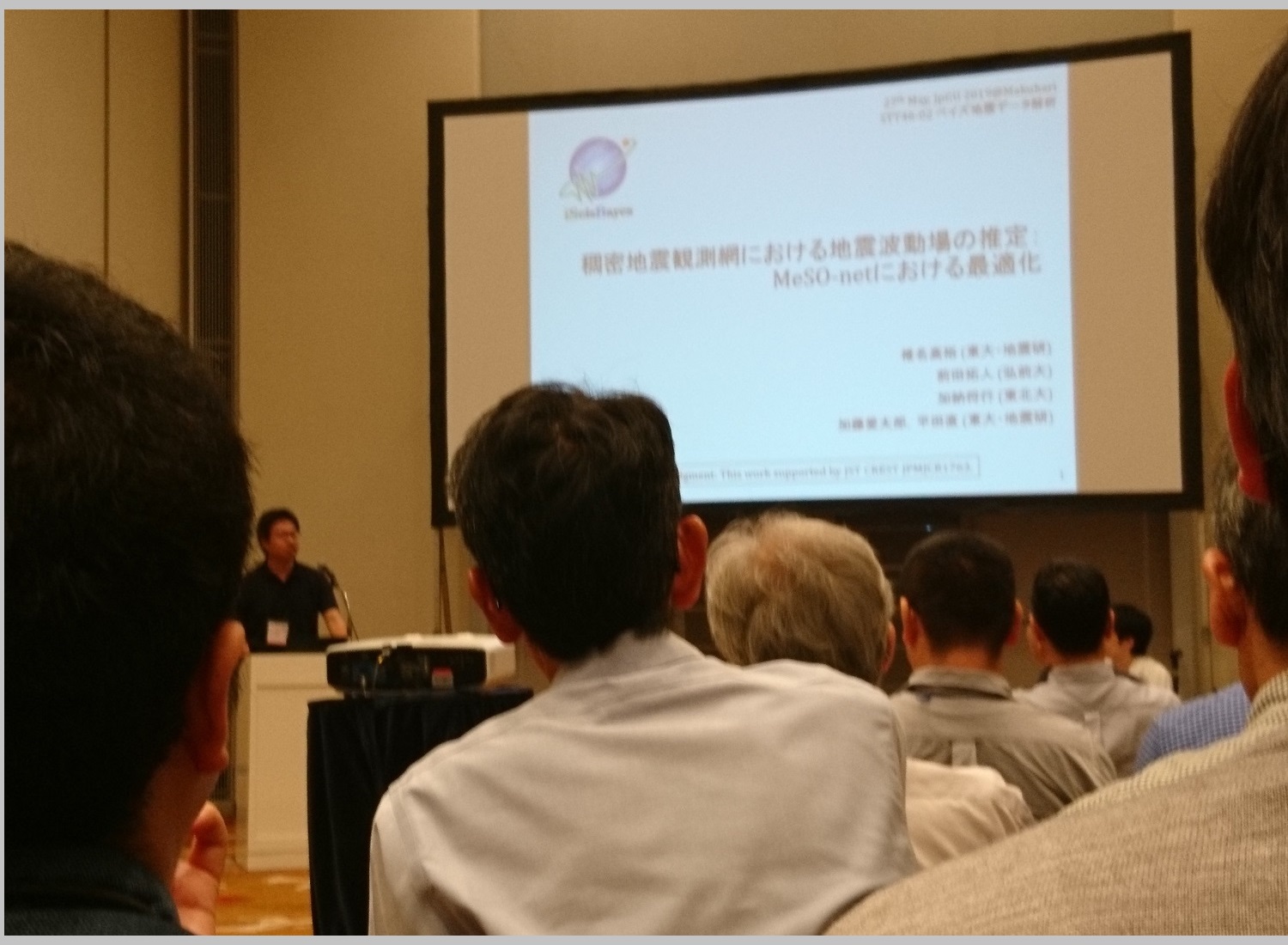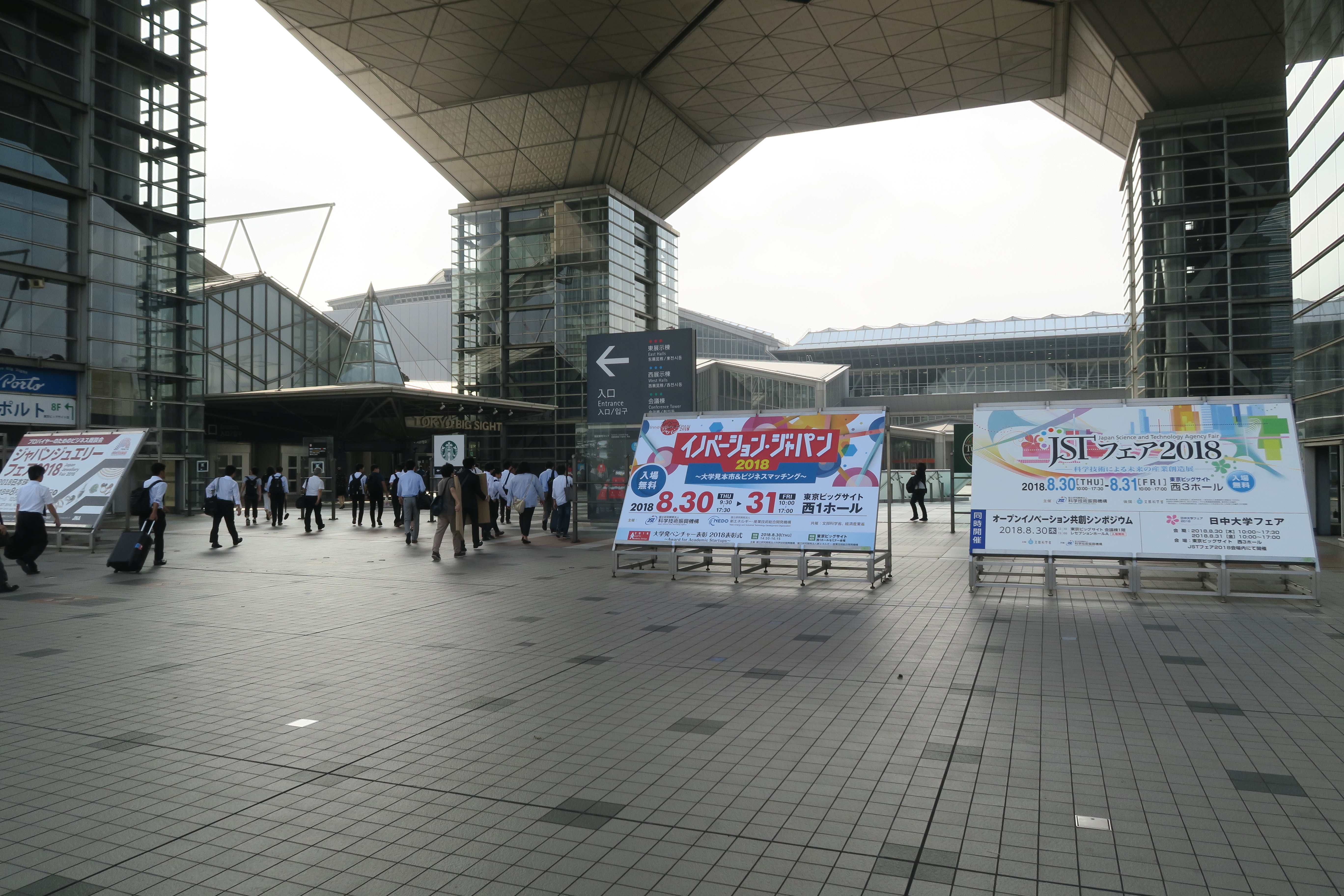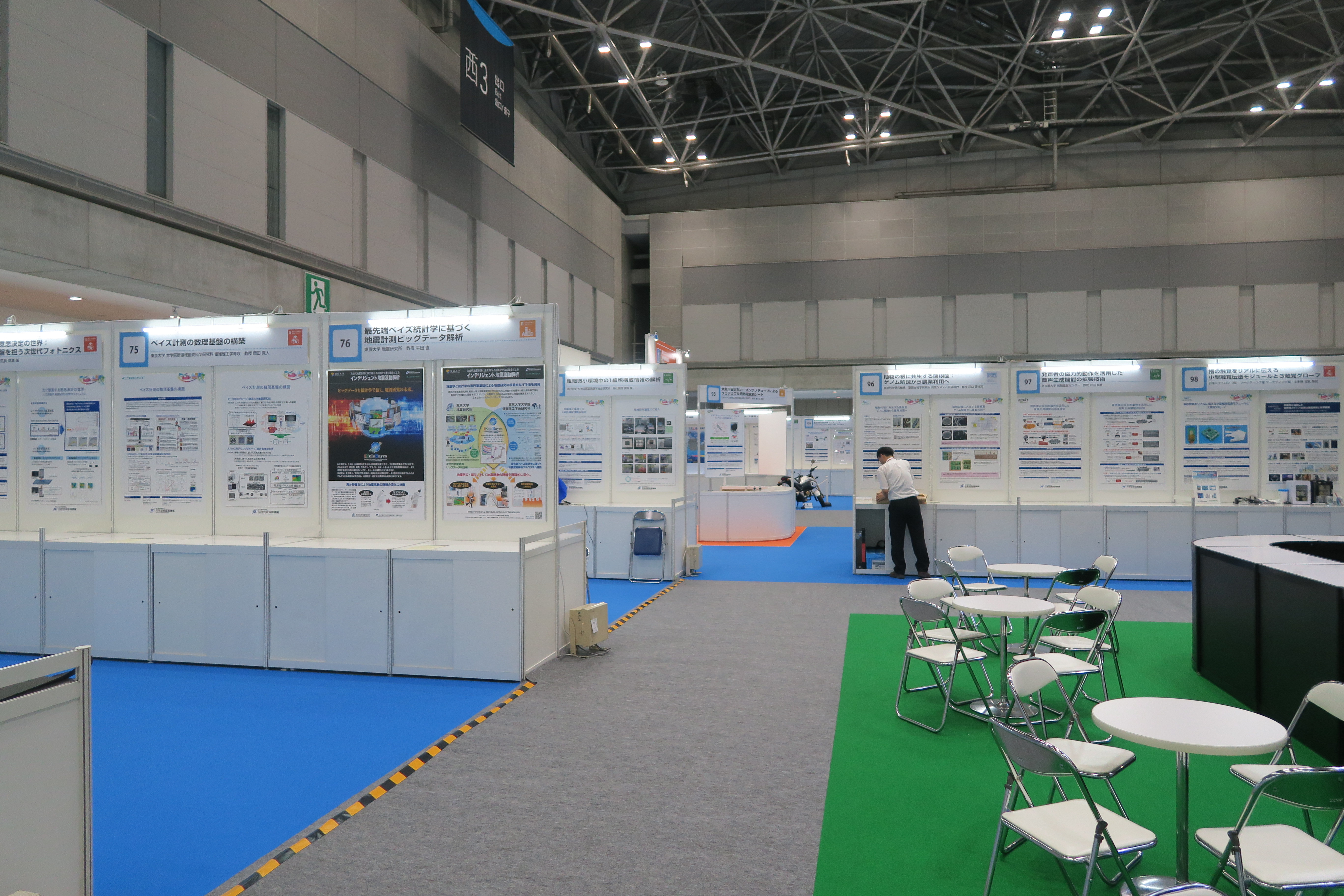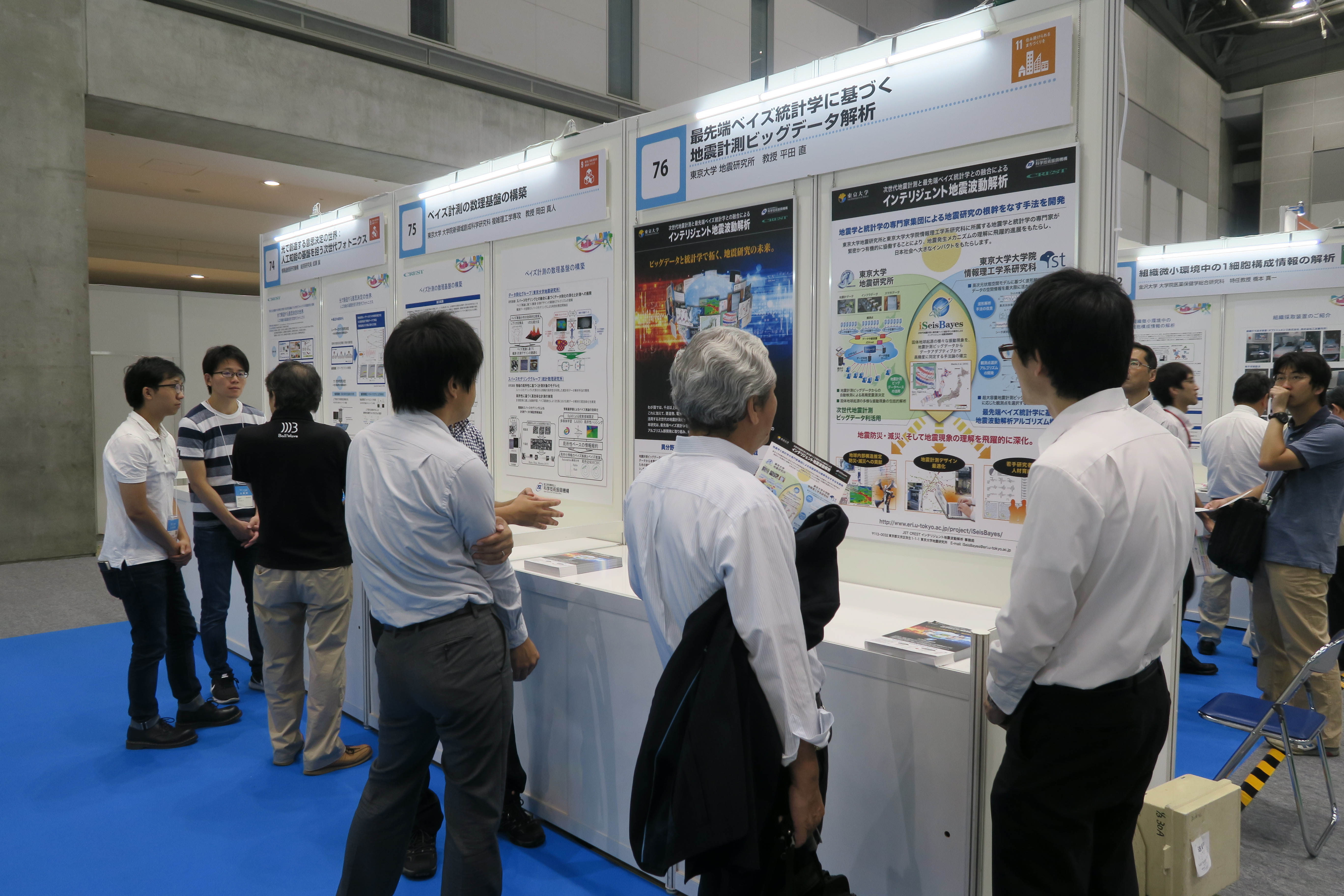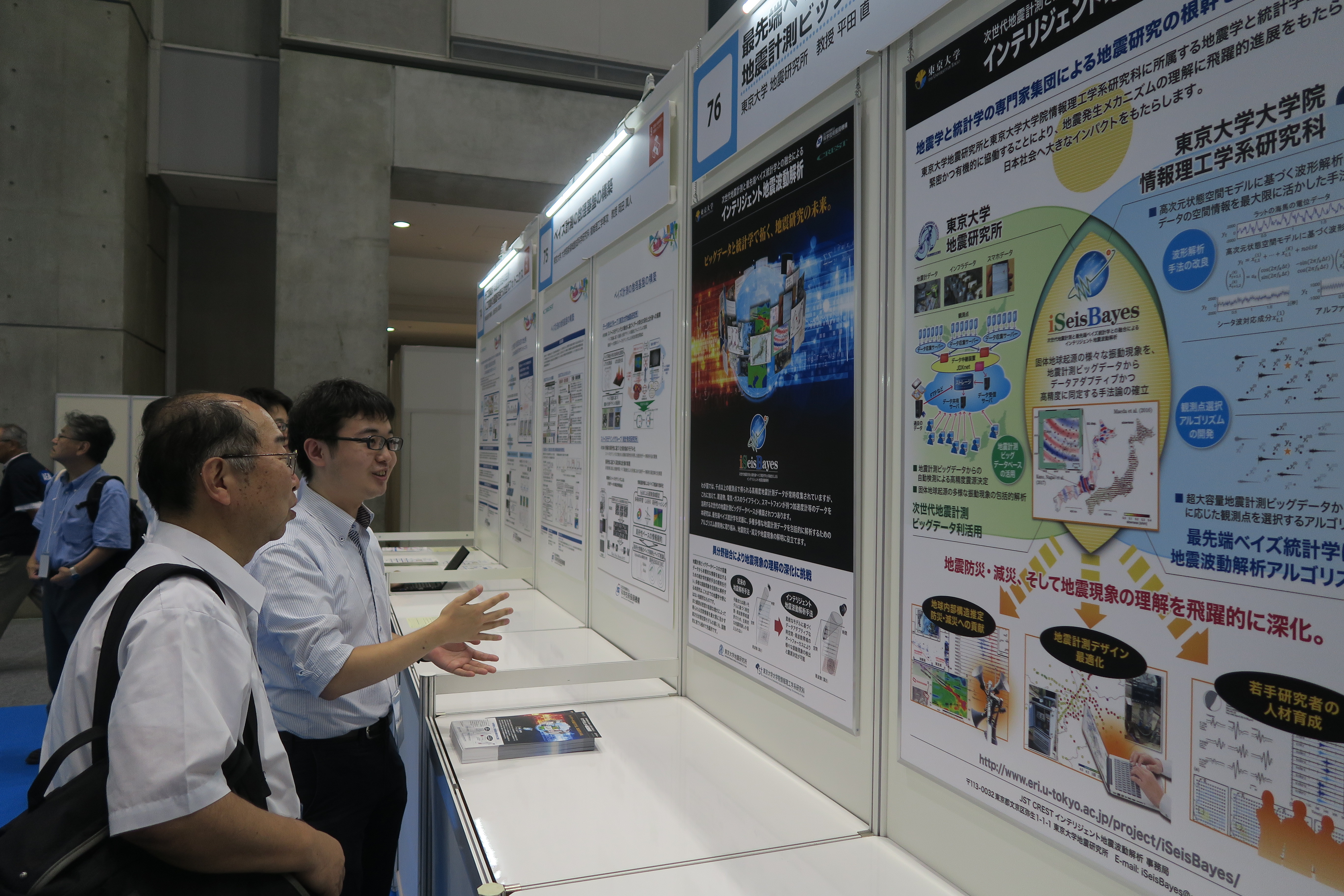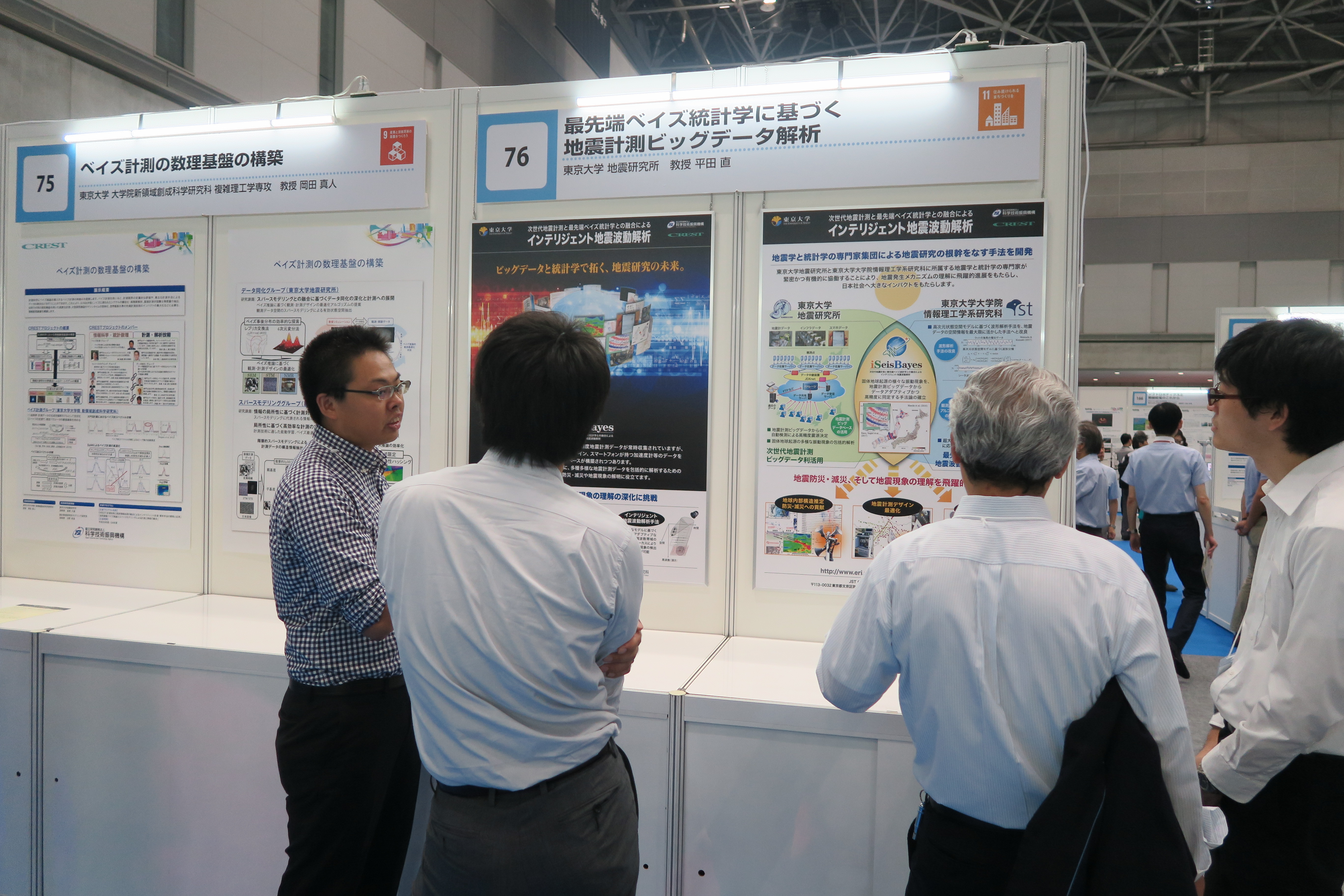Notice
JpGU2022 (May.22-Jun.3, 2022)
We exhibited at JpGU2022, a hybrid of online and Makuhari Messe International Exhibition Hall, as the Earthquake Research Institute of the University of Tokyo.Leaflets and an explanatory staff were placed in the booth along with iSeisBayes panels to introduce the progress of the project.
We held the oral and poster sessions. Over 100 people came to listen to the lecture.
[S-TT40] Seismic Big Data Analysis Based on the State-of-the-Art of Bayesian Statistics
Oral
1. [Invited Speaker] Naonori Ueda (RIKEN Center for Advanced Intelligence Project)
2. Takahiro Shiina (National Institute of Advanced Industrial Science and Technology)
3. Tomohisa Okazaki (RIKEN Center for Advanced Intelligence Project)
4. Tomoki Tokuda (The University of Tokyo)
5. Hiromichi Nagao (The University of Tokyo)
Poster
1. Kosuke Morikawa (Osaka University)
2. Ryo Kurihara (The University of Tokyo)
3. Rui Toyama (The University of Tokyo)
4. Takayuki Nagata (Tohoku University)
5. Kumi Nakai (Tohoku University)
6. Sumito Kurata (The University of Tokyo)
7. Shin-ichi Ito (The University of Tokyo)
8. Daisuke Sato (Kyoto University)
AOGS2021 (Aug.1-6, 2021)
AOGS2021(Asia Oceania Geosciences Society 18th Annual Meeting) was held online this year. In that site we held a session entitled "Data-driven Modeling in Geoscience".
Session Description:Numerous observational/experimental "big data" obtained by recent extensive observation systems and/or high-sensitive sensors have substantially contributed to spatiotemporal modeling in various fields of geoscience. However, even such big data are still insufficient to comprehensively understand the whole static and dynamic systems of the Earth, so that modeling techniques, such as sparse modeling, data assimilation, emulation and other mathematical methods, play important roles to extract essential information from high-dimensional data. This session especially focuses on methodologies beneficial to data-driven modeling, and highly welcomes papers related to such as (1) information-science methods that are capable of extracting essential information from high-dimensional data and/or uncovering unobservable structures, (2) actual modeling based on statistical modeling from real observational/experimental data, and (3) miscellaneous mathematical methods useful in data analyses.[IG6] Data-driven Modeling in Geoscience
Dr. Shunichi Nomura (Waseda University)
Dr. Ryoichiro Agata (Japan Agency for Marine-Earth Science and Technology)
Dr. Shin-ichi Ito (The University of Tokyo)
Dr. Dmitri Kondrashov (University of California, Los Angeles)
JpGU-AGU2021 (May.30-Jun.6, 2021)
JpGU2021 was held online this year. In that site we held a session entitled "Seismic Big Data Analysis Based on the State-of-the-Art of Bayesian Statistics" and had some invited speakers. We had access to over 100 participants.
[S-TT37] Seismic Big Data Analysis Based on the State-of-the-Art of Bayesian Statistics
1. Suguru Yabe (National Institute of Advanced Industrial Science and Technology)
2. Takahiro Shiina (National Institute of Advanced Industrial Science and Technology)
3. Sumito Kurata (The University of Tokyo)
4. [Invited Speaker] Hideitsu Hino (The Institute of Statistical Mathematics)
5. Kumi Nakai (Tohoku University)
6. Yoshihiko Ogata (The Institute of Statistical Mathematics)
JJSM 2020 (Sep.9-12, 2020)
We organized a session entitled "The forefront of earthquake big data analysis" in Japanese Joint Statistical Meeting 2020 held online. We presented as lecturers.
[2AAM] "The forefront of earthquake big data analysis"
1."Convolutional neural network based earthquake detection using a seismic array" Keisuke Yano (The Institute of Statistical Mathematics)
2."Estimation of earthquake source parameters and selection of probability density function using Markov chain Monte Carlo method" Nana Yoshimitsu (The University of Tokyo)
3."An estimation of seismic wavefields in nonuniform distributed seismograph array: Applications to MeSO-net" Takahiro Shiina (National Institute of Advanced Industrial Science and Technology)
4."Uncertainty quantification for frictional parameter fields in slipping fault based on variational data assimilation" Shin-ichi Ito (The University of Tokyo)
JpGU-AGU2020Virtual (Jul.12-19, 2020)
JpGU-AGU2020 was held online this year. In that site we held a DFS(discussion forum session) entitled "Seismic Big Data Analysis Based on the State-of-the-Art of Bayesian Statistics" and invited several researchers from overseas as invited speakers. We had access to over 150 participants.
[S-TT52] "Seismic Big Data Analysis Based on the State-of-the-Art of Bayesian Statistics"
1."Multiple classes of non-tectonic emergent and impulsive seismic noise identified in continuous waveforms" Christopher W. Johnson (Los Alamos National Lab)
2."Uncertainty Quantification for Inhomogeneous Frictional Features in a Slow-Slipping Fault Based on a Large-Scale Four-Dimensional Variational Data Assimilation" Shin-ichi Ito (The University of Tokyo)
3."A hidden Markov model for overlapping of seismic waves" Sumito Kurata (The University of Tokyo)
4."Prediction of Aftershocks With Gaussian Process Regression: Application to the 2004 Chuetsu Earthquake" Kosuke Morikawa (Osaka University)
5."On statistical declustering of global earthquake catalogue" Debashis Mondal (Oregon State University)
JJSM 2019 (Sep.8-12, 2019)
We organized a session entitled "The forefront of earthquake big data analysis" in Japanese Joint Statistical Meeting 2019 held in Hikone, Shiga University. We invited some famous professors and researchers as lecturers.
StatSei11 workshop (Aug.18-21, 2019)
We organized a pre-workshop entitled "Recent Developments of Bayesian Methods to Utilize Seismic Big Data" in 11th International Workshop on Statistical Seismology (StatSei11). All talks in the pre-workshop attracted the interests of a lot of international attendees, and provoked lively discussions.
Organizers: Hiromichi Nagao, Keisuke Yano (The University of Tokyo)
- "Optimized Wavefield Estimations Based on Seismic Wave Gradiometry Method" By Takahiro Shiina
- "Earthquake Detection Using Deep Learning for Continuous Seismic Network Records" By Keisuke Yano
- "Local Earthquake Tomography Using Structured Sparsity Regularization for Seismic Velocity Modeling" By Yohta Yamanaka
- "Uncertainty Evaluation of Source Parameter Estimates by MCMC in Oklahoma" By Nana Yoshimitsu
- "Uncertainty Quantification Based on 4DVar Data Assimilation for Massive Simulation Models" By Shin-ichi Ito
Dr.ROSS, an assistant professor, in CalTech was invited to give a presentation.
- "A Deep Learning Pipeline for Earthquake Monitoring"
JpGU exhibit (May 26-30, 2019)
We exhibited as Earthquake Research Institute, The University of Tokyo, at Japan Geoscience Union Meeting 2019 (JpGU) held in Makuhari Messe. We have placed panels, leaflets and explanations in the booth in order to show off new project initiatives.
At the room A08, we held a session entitled "Seismic Big Data Analysis Based on the State-of-the-Art of Bayesian Statistics". It was so popular and jam-packed that we came to understand again just how high-profile this area is.
13:45-14:00 "A bad inversion result suggests bad modeling"
14:00-14:15 "A seismic wavefield estimation in a dense seismograph network:An optimization for the MeSO-net"
14:15-14:30 "Uncertainty quantification based on 4DVar data assimilation for massive simulation models"
14:30-14:45 "Bayesian approach for statistical modeling and forecasting of aftershock activities"
14:45-15:00 "Bias Correction for the Distribution of Aftershoks Within Short-Term Period Immediately After Large Main Shock"
15:00-15:15 "Deep-learning-based Earthquake Detection for Continuous Seismic Network Records"
JST Fair (Aug.30-31, 2018)
We exhibited a booth that introduced our new project "iSeisBayes" at Japan Science and Technology Agency Fair held in Tokyo Big Sight.








